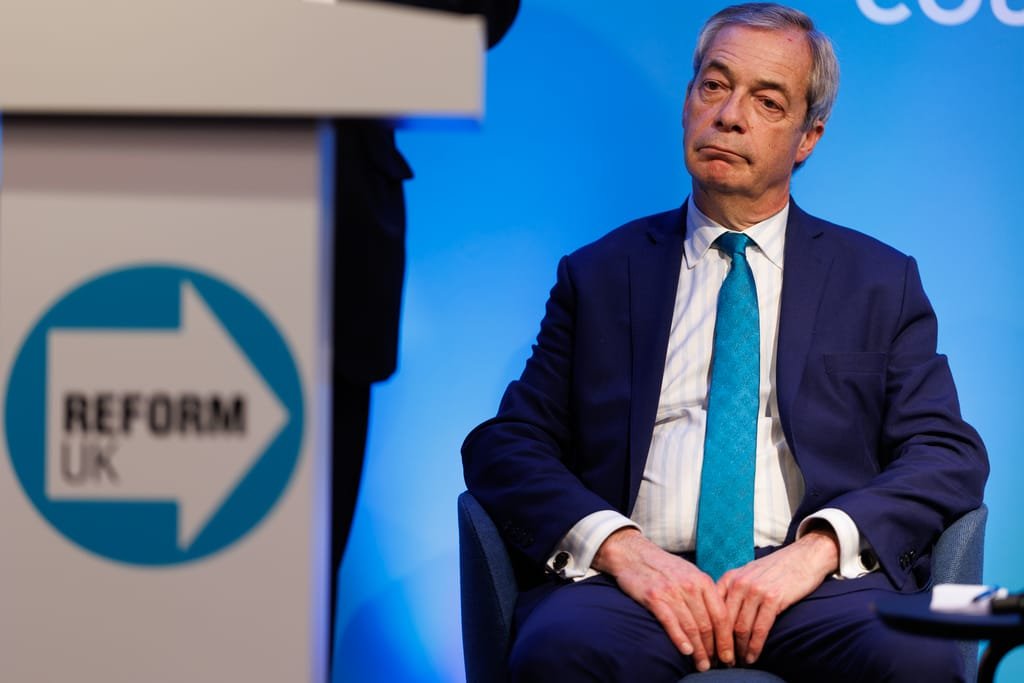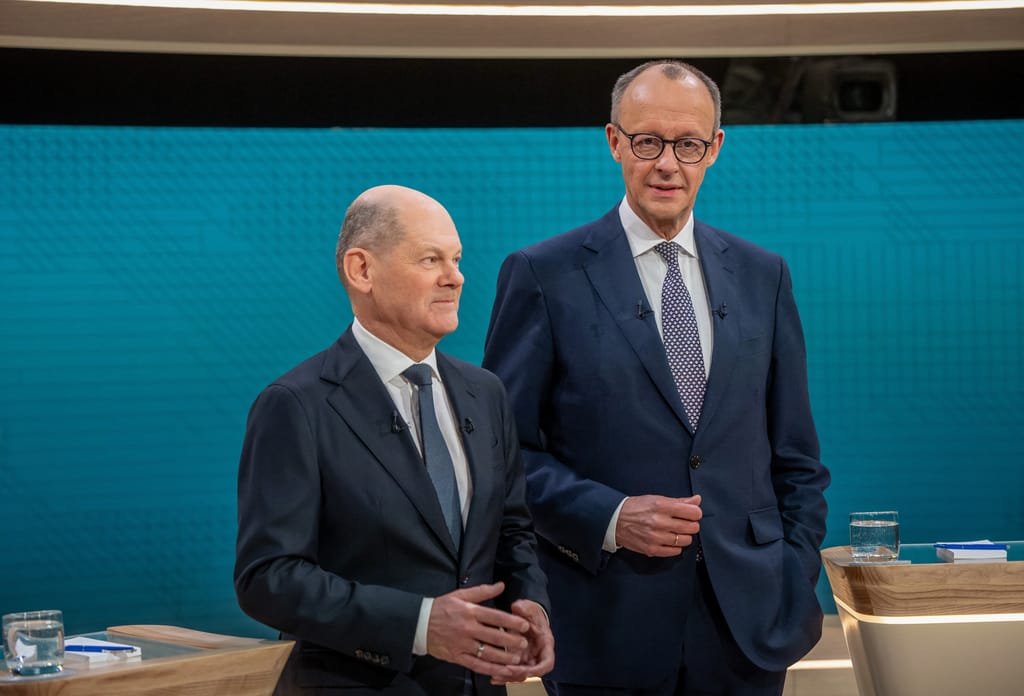The Brexiteer’s Reform UK party is climbing in the polls — but fighting him on his terms risks fracturing Labour’s coalition.

LONDON — Nigel Farage used to be seen as merely a nuisance by the British left — a buzzing mosquito that should be quietly swatted away.
But now his populist, right-wing Reform UK party is surging in the polls. And Keir Starmer’s ruling Labour Party is trying to fight Farage on his own turf.
Wary of how the incumbent Democrats were routed by the anti-immigration campaign of Donald Trump in the United States, Starmer’s government has been markedly shifting its tone to appear much more hardline on immigration.
The unauthorized arrival into the U.K. of thousands of asylum seekers after perilous crossings of the English Channel on small boats has been a major concern for many Brits in recent years.
To counteract the very visual breaches of the border, the government this week chose for the first time to release footage of people being put onto a deportation flight. Labour has also copied Reform’s branding in social media posts celebrating migrant removals. And Starmer has criticized Farage directly.
“People tried to ignore him,” said one government official, granted anonymity like others in this article to speak candidly about strategy. “Look how that turned out.”
But Labour’s left flank is already angry about the shift in tone — and the government’s more progressive-sounding opponents believe they can now win over voters put off by the bid to take on Farage on his terms.
The man whose name shall not be spoken
A new Labour MP in their early 30s recalled a “gasp” among their cohort on first seeing Farage enter the House of Commons chamber after last July’s general election. It was “as if Voldemort had walked in,” they quipped.
They, like others their age, had viewed Farage as a kind of fictional villain, not unlike Harry Potter’s nemesis, for most of their adult lives. Now they are finding the challenge of grappling with his politics is very much real life.
Reform, on the other hand, is relishing the opportunity to have it out. “Nigel Farage has no problem if Labour wants to fight us on our own turf,” a senior Reform official said.
At last July’s general election, Labour focused nearly all of its firepower on combating the Conservatives, as Starmer’s troops rode an anti-Tory wave to a landslide victory as the electorate looked to punish the party that had been in charge for 14 years.
But the victory was slightly dampened by the realization that the insurgent Reform party had won 14 percent of the national vote — and came second to Labour in an astonishing 89 seats.
Now, with the government facing the almighty task of improving the country’s ailing public services and woebegone economy, all while staying within the bounds of its own red lines on public finances, it is polling at similar levels to Reform, a party only a few years old.

Reaching a significant milestone for the first time, Farage’s insurgents topped a major poll in recent weeks, edging in front on 25 percent, with Labour second on 24 percent.
It seems to be no outlier. The next general election doesn’t need to be held until August 2029, but a real test is coming: local elections for regional authorities are just around the corner. They could provide further gains for Reform, and a boost to Farage’s narrative he’s on the march to power — so Labour is eager to start the political fight without delay.
Wes Streeting — the health secretary seen as the government’s most confident, and willing, public performer — launched the most direct attack by a cabinet minister late last month.
The MP used a speech to accuse Farage of having a “miserabilist, declinist” vision of nation, one that claims “what was possible in the 20th century isn’t possible in the 21st.”
Crucially, Streeting pinned this to Farage’s open-mindedness to replacing the NHS — the free-to-use healthcare system established after the Second World War — with an insurance-based model. Given the NHS’s popularity among Brits, it’s a subject Labour thinks is a real weakness for Farage.
Ministers are also looking to up their attacks on the Reform leader over his perceived weakness on Vladimir Putin, the Sun newspaper reported. Reform insiders conceded their leader’s previous comments on the West provoking the Russian president’s invasion had been unhelpful at the last election.
Talking tough
While trashing Farage is one half of the equation, Labour is also in some ways trying to appease the concerns he raises most — and even mimic his party.
Starmer fired the starting gun on this at an extended cabinet meeting last week by issuing a warning to members of his party who are uneasy about a more hawkish stance on migration.
“Progressive liberals have been too relaxed about not listening to people about the impact of it,” the Labour leader warned, railing against those he accused of being “complacent about the effects of globalization” on voters who feel left behind. Farage’s ears would’ve no doubt been pricking up at that.
Videos of immigration raids have also been released to show the action being taken against people illegally working in Britain. And even more controversial is the footage of people being led onto a deportation flight, in what the Home Office described as a “first.”
Government officials described this as being part of a “show, not tell” approach to counteract the potency of the regular images showing dinghies packed with people arriving on the southern coastline without authorization before they claim asylum.
Some Labour MPs in seats where Reform is polling strongly have set up a pressure group urging Downing Street to go further on migration and crime to counteract the threat from the right.
One in a Reform-facing seat said they want to see the government be “more forceful” in demonstrating control of the country’s borders by making an even bigger deal of successful deportations.
But others, particularly those on the left of the party, are outraged by the move.
MP Clive Lewis accused ministers of “enabling the mainstreaming of racism” over the deportation flight footage. And colleague Diane Abbott hit out at the video showing raids on illegal workers over the weekend. “Trying to present ourselves as Reform-lite is a big mistake,” she warned.
Both are staunch anti-racism campaigners, but they are also MPs in cities facing a different electoral threat — the left-wing Green Party came in second place in both of their constituencies at the last election.
The Greens now boast four MPs, having dispatched a would-be Cabinet minister in Bristol by riding a wave of left-wing anger at Starmer’s more centrist Labour. They now hope to peel off more of Labour’s progressive voters as Starmer steers the party further rightwards.

A long-serving Labour aide rejected the idea that talking tougher and tougher on immigration will deliver votes. Better, they said, to promote policies that resonate with blue-collar voters, including increasing the allowance for carers and massively boosting workers’ and renters’ rights.
One minister who discussed how to better sell the government’s policy platform chose to stress those policies, too, over the immigration crackdown.
“We are the last chance of a sane government,” they said. “If we don’t deliver, people will start turning to the insane right.”
‘Control and compassion’
Sunder Katwala, the director of the British Future think tank that focuses on migration, said there are “definitely risks” that Labour’s choice to chase Reform voters could boost the Greens, as well as the SNP in Scotland.
This risk, he said, is heightened particularly if Labour MPs try to give different messages to different constituencies while focusing too much on the “insatiable” voters who will think immigration is too high regardless of whether numbers fall.
He argued Labour could be successful in appealing to a “broad balance” across the U.K. if it talks about both “control and compassion” — on one hand talking about a crackdown on irregular migration while also discussing how it wants genuine refugees to stay in Britain if they’ve arrived through regular means. Being the party who scrapped the Conservatives’ highly controversial — and ultimately ineffective — plan to forcibly remove small boat arrivals 5,000 miles away to the authoritarian state of Rwanda could be another mollifying point.
“You can’t outflank a populist party on slogans,” Katwala argued. “A government will be judged on delivery.”
Luke Tryl, the U.K. director of the More in Common think tank, reckons the “show, not tell” approach has the potential to overcome some problems in government messaging, with the record numbers of removals having “amongst the lowest cut through of any Labour policy.”
But he stressed a need to avert the “danger” of “just pushing the discourse further in a direction that benefits that populist right.” One way to do this, he argued, is to point out the “flaws” and the “unworkability” of Reform’s platform.
Tryl also suggested progressives could be kept on side because of an “asymmetry” in just how concerned each wing is about major issues. Anti-immigration voters care deeply about border controls, but those who are pro-migrant accept that numbers should be brought down or small boats crossings specifically must be tackled. Progressives care much more about the climate.
“If they seem to be slowing down on something like that, that’s where you start to lose that group much more than being tougher on immigration,” Tryl said. That may however spark another conflict as the government tries to pull out all the stops to drive economic growth.
Whatever the success of Labour’s new shift it proves one thing. The name Nigel Farage will not go unspoken again for some time to come.





